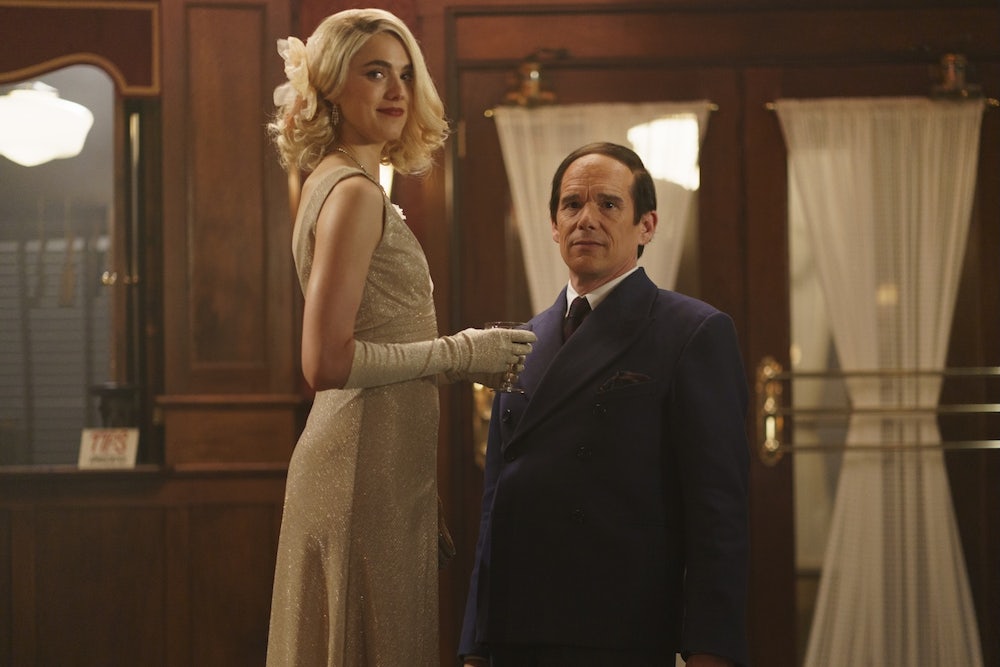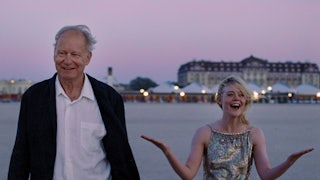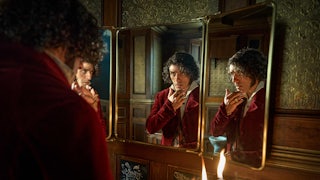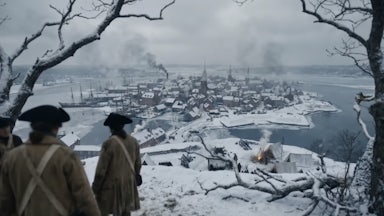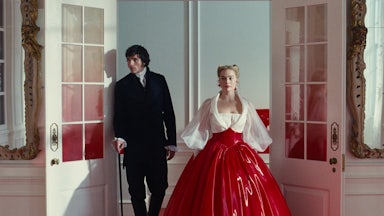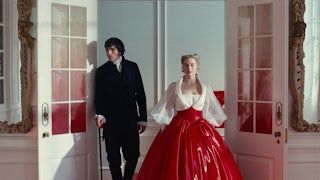Sad songs, it has been said, say so much. (They are also, as fans of Mr. Show already know, nature’s onions, but I digress.) The lyrics of Lorenz Hart typically made for (and in duet form, replicated) great conversation, even if it was often apparent that the man behind so many secular hymns of desire—requited and otherwise—was talking to himself. To the extent that Hart was a public figure, portrayed posthumously by Mickey Rooney in 1948’s Words and Music, the MGM hit mythologizing his creative partnership with composer Richard Rodgers, he was part of a double act, preceded and defined by the ampersand connecting him to his more dashing collaborator. Those who knew Hart privately, though, perceived him quite differently. More often than not, they saw him standing alone, without—well, you know the rest.
The dream in Lorenz’s heart—that he might have a love of his own—is at the center of Richard Linklater’s Blue Moon, which offers a strategically finessed vision of its subject’s lonely final days. (Hart died of pneumonia in 1943, at the age of 48; he never married or had children.) The film offers itself up as a stiff tonic to the airbrushed hagiography of Words and Music, as well as a companion piece to its director’s other fall release, Nouvelle Vague, with which it makes a fascinating double bill about the pleasures and aches of the art life.
Linklater, who never makes the same movie twice—except when he does it three times, as in Before Sunrise, Before Sunset, and Before Midnight—is an inveterate formalist who’ll try anything in good faith. A onetime Amer-indie figurehead who leveled up without selling out and isn’t precious about churning out work on the regular, his closest analogue is probably Steven Soderbergh, but with a shaggier and more open-hearted sensibility. Last year’s underrated Hit Man was offered a meditation on identity and impulse disguised as a sexy neo-screwball romp. Here, the director adopts the form of something old-fashioned and even slightly anti-cinematic—the dark-night-of-the-soul-melodrama, set in one location and in near real-time—in an attempt to evoke an idea of a hallowed showbiz past and to distill a Broadway lifer’s potent, melancholy essence.
Linklater is also interested in hinge moments, whether via the-end-of-high-school bacchanal of Dazed and Confused or the temporal gamesmanship of Boyhood. (His ongoing, years-in-the-making adaptation of Merrily We Roll Along fits this template as well.) Blue Moon gives its protagonist a front row seat at the changing of the showbiz guard; the main reason that Larry (Ethan Hawke) finds himself at Sardi’s in Manhattan—beyond the fact that he’s a regular with a long-since pickled liver—is to celebrate Rodgers’s box-office-busting success with Oklahoma!, the crowd-pleaser he’s crafted in collaboration with the more populist-minded lyricist Oscar Hammerstein II. The latter was once described by critic Mel Gussow as “monumentally happy and efficient”; in this, he was Hart’s opposite’s number, and behind the scenes, his bête noire, even as they traded encomiums to one another’s genius.
As Linklater’s film opens, Larry is miserable and at loose ends, and happy to tell anybody within earshot why. Rolling in from a sold-out show of Oklahoma!, Larry begs the indulgence of bartender Eddie (Bobby Cannavale) and ivory-tickler Mort (Jonah Lees) as he waxes apoplectic about the phoniness of his old buddy’s new hit. “Oklahoma exclamation point!” he sneers, as offended by the title’s punctuation as its embedded exaltation of all things Americana; if Rodgers’s fateful decision to change creative partners in midstream sliced Larry’s self-esteem to ribbons, Hammerstein’s salt-of-the-earth lyrics are like salt in the wound. When the conquering heroes finally show up, though, Larry waxes diplomatic, telling Richard (Andrew Scott) that Oklahoma! is a classic, and likely to run for twenty years. The praise is disingenuous, but the underlying diagnosis of the show’s triumphal, cornpone populism is apt: Imagine a cowboy boot square-dancing on a human face, forever. What Larry particularly resents is the way that Oklahoma!’s apple-pie-eyed exuberance—sweetheart promises and platitudes with all that fringe on top—seeks to infantilize an audience previously weaned on his own repertoire of sly double entendres. It’s not just Richard who’s broken up with Larry, but an entire popular art form.
His response to being thrown over is to hurtle himself at a new and unlikely target: Elizabeth Weiland (Margaret Qualley), a 20-year-old Ivy Leaguer who carries herself like a wisecracking neo-Bohemian muse and may or may not be hypnotized by the stars Larry’s been putting in her eyes during their May-December mentorship. Their arrangement is somewhere between those shown in Trilby and Pygmalion; Eddie and Mort can’t help but perk up at Larry’s jokes about Elizabeth’s myriad “ineffable” and “effable” qualities while wondering, quite reasonably, who’s grooming whom. If Elizabeth is too good to be true, it’s a built-in function of Robert Kaplow’s script, which was inspired by Hart’s apparently authentic correspondence with a young woman of the same name; the casting of Qualley—currently in the middle of a sterling run playing literal and figurative fantasy objects—plays up the idea of a cipher who’s been enchanted around the edges.
Linklater and Kaplow previously limned showbiz myth in Me and Orson Welles, a film whose title draws out a winning mix of hubris and humility (it’s almost a rite of passage for American auteurs to try to measure themselves against the maker of Citizen Kane). Christian McKay played Welles as a brilliant raconteur holding Zac Efron’s wannabe Broadway star in thrall, but also feeding off the younger man’s own passionate naïveté—the same dynamic at work in Blue Moon. Ostensibly, Larry wants to sleep with Elizabeth, whom he describes to his pals in the purplest prose imaginable despite the unspoken (but still deafening) consensus about his homosexuality (“I always thought that your interests went more … towards …” offers Eddie, who’s gently loath to fill in the blank.) Kadlow and Linklater are less interested in pigeonholing Hart’s sexuality than connecting his ardor for Elizabeth to the polymorphous sensuality of lyrics—all those bristling innuendos (“and if you’re good, I’ll search for wood” from “Mountain Greenery”)—and the satirical thrust of his personality. Whether Elizabeth is as bewitching, bothersome, and bewildering as advertised matters less than the fact that Larry needs her to be, so that he has an altar at which to worship—even if it’s located in what a lesser word-slinger than himself might term the friend zone.
There’s something schematic—bordering on mechanical—about how Blue Moon sketches the contours of Larry’s public persona and inner life, and how his neuroses intersect with those of the people around him. The gently accelerating momentum of the party, with all of its awkward, tight-lipped encounters between peers and rivals gives off the hum of the proverbial well-made play, but it’s so well-made that it doesn’t really matter. Watching people wind up and unravel in real time is a Linklater specialty dating back to Slacker, and his direction here is wonderfully precise, carving Sardi’s into a series of dark corners and common spaces that serve variably as an amphitheater for Larry’s borderline-logorrheic standup act and a crucible for his courage. The character is so physically and intellectually restless that he could be an atom in a smasher, and while there are aspects of Hawke’s performance that verge on stunt-man status—i.e., the compositional and costuming effects that knock 11 inches off his lanky stature—he’s such a committed actor, connected so solidly to Larry’s compartmentalized arrogance and insecurity, as well as to Linklater’s rollicking and melancholy control of tone, that he conquers the tightrope.
“I’ve written a handful of words that cheat death,” Larry says at one point: a line that rings with the truth of prophecy, even as the movie around it becomes more morbid. Kaplow lays on the ominous structuring devices—Larry’s sputtering attempts to secure face time with Richard, and then with Elizabeth; his promise of a lavish after-party for VIPs alone—while Linklater finds images delicate enough to leaven them; a shot of Hawke crawling on the floor, gathering up a handful of playing cards for a trick he’s too shaky to perform, accesses a wounded dignity that, crucially, brooks no pity. The sheer life force of Hawke’s acting—the delight that Larry takes in getting laughs and scoring points off his friends, in trading perfect phrases with fellow wordsmith E.B. White (a wonderful Patrick Kennedy), in proudly watching Richard bask in the adulation he suspects will never be directed his way again—makes it impossible to see Larry as a sad sack; the closing shot of his caricature hanging on the wall at Sardi’s suggests impermanence and immortality joined at the hip, like words and music. “Your looks are laughable, unphotographable, yet you’re my favorite work of art,” wrote Hart in “My Funny Valentine.” As ever, he was his own most ardent suitor, and gave the rest of us words with which to yearn.
